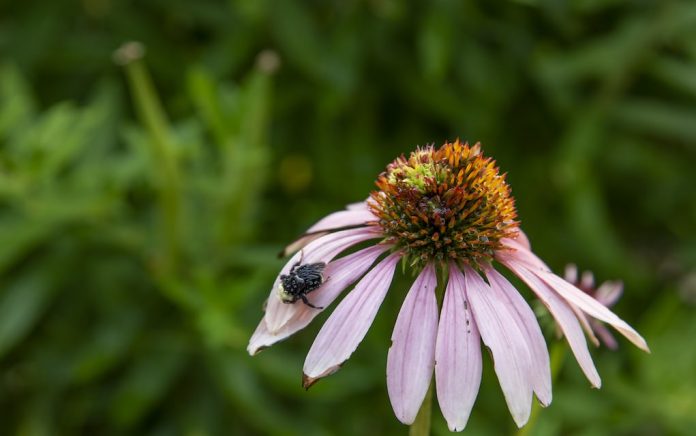
When the topic of natural herbal remedies for cold and flu comes up, Echinacea is typically the first remedy that comes to mind. This member of the daisy family (Asteraceae) is a perennial plant that boasts purple to pink petals with a spiky center seed head (cone), earning it the name of American coneflower. You don’t have to look far to find Echinacea remedies in pharmacies, supermarkets, online, and health stores, where it is available as capsules, pills, liquid extracts, teas, and the dried herb.
A quick primer on Echinacea
Of the nine species of Echinacea, three are used in natural remedies: Echinacea angustifolia, E. pallida, and E. purpurea. These are the three you should look for on supplement labels.
Experts have identified some of the active substances in the plant, including phenols, which are known for their antioxidant properties. Phenols also regulate the activity of enzymes and cell receptors and protect the plant from ultraviolet damage and infections.
Only Echinacea angustifolia and E. purpurea also contain alkylamides or alkamides, which have a positive impact on immune system functioning. Another compound in the herb is caffeic acid, which possesses anti-inflammatory, antioxidant, and anticancer qualities.
Now that we got that out of the way, let’s look at the wonders and science of Echinacea.
Echinacea and the immune system
Much of the focus on Echinacea and the immune system is on its use in the common cold, so we will start there. Studies on Echinacea and its impact on the common cold have produced conflicting results, but the trend is toward the positive. For example, a review of more than a dozen studies on the effect of Echinacea on people’s chances of catching a cold found a 58 percent reduced risk among those who took the herbal remedy. Echinacea use also reduced the length of time a cold lasted by 1.4 days.
Read about 5 ways to boost your immune system
In a 2016 report from Drexel University, the author reported on the findings of “the largest clinical trial to date that evaluated the safety and efficacy of Echinacea purpurea for prophylactic treatment of the common cold,” as well as looking at the risks associated with long-term use. The findings revealed Echinacea was effective as a cold preventive treatment over four months and that “long-term prevention was associated with a reduction in the total number of cold episodes, a reduction in the number of days with colds, and a reduction in cold episodes requiring additional medication.”
Taking a broader view, another research effort looked at the use of Echinacea supplements in individuals with respiratory tract infections. The review evaluated 66 articles, and the authors concluded that “there is a considerable amount of evidence that shows the effectiveness of Echinacea products in the prevention and treatment of respiratory tract infections.”
What else can Echinacea do?
Mouth or canker sores (aphthous ulcers) can be especially painful and annoying, and Echinacea may come to the rescue. A 2018 study reported that Echinacea tablets had a positive effect on the number of ulcers, pain intensity, improvement, and recurrence among individuals with minor aphthous ulcers.
Read about healing canker sores
Echinacea also has shown some promise in treating atopic eczema, a chronic inflammatory skin disease that is challenging to treat. Preliminary research has shown that extracts of the herb showed “remarkable anti-inflammatory actions” against the disease and that “it will be very likely a well-tolerated, powerful novel ingredient” and companion treatment for atopic eczema.
Possible side effects of Echinacea
Echinacea belongs to a family that includes ragweed, chrysanthemums, and marigolds, and these plants—especially ragweed—are among those to which many people have an allergy. You should not take Echinacea if you are allergic to these plants. Common allergic reactions can include rash, serious trouble breathing, and worsening of asthma symptoms. Otherwise, the most common side effect of taking Echinacea is an upset stomach.
For many people, Echinacea can be a safe, effective natural remedy for boosting immune system function and helping address health issues related to immune challenges.
Sources
Daneschmehr MA, Tafazoli A. Providing evidence for use of Echinacea supplements in Hajj pilgrims for management of respiratory tract infections. Complementary Therapies in Clinical Practice 2016 May; 23:40-45
Khozeimeh F et al. Effect of herbal Echinacea on recurrent minor oral aphthous ulcer. Open Dentistry Journal 2018 Aug 31; 12:567-71
Olah A et al. Echinacea purpurea-derived alkylamides exhibit potent anti-inflammatory effects and alleviate clinical symptoms of atopic eczema. Journal of Dermatological Science 2017 Oct; 88(1): 67-77
Ross SM. Echinacea purpurea: a proprietary extract of Echinacea purpurea is shown to be safe and effective in the prevention of the common cold. Holistic Nursing Practice 2016 Jan-Feb; 30(1): 54-57
Sha SA et al. Evaluation of Echinacea for the prevention and treatment of the common cold: a meta-analysis. The Lancet 2007 Jul 1; 7(7): 473-8











